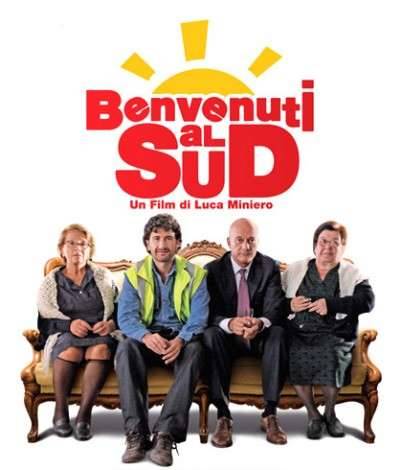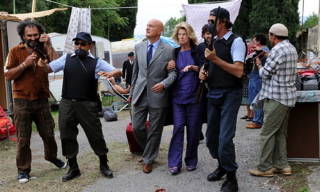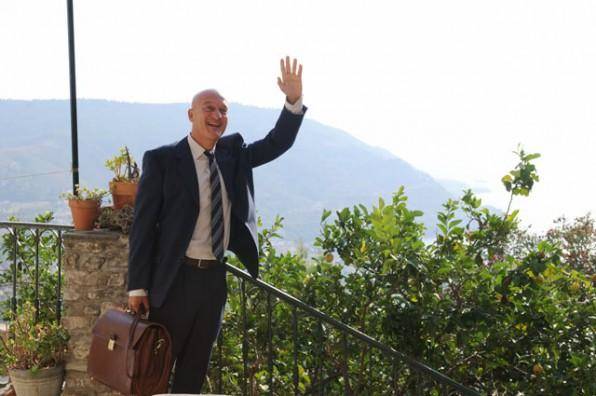Heart warming vs heart breaking
ROME – Here you have it – heart-warming fiction vs. heart-breaking reality. To begin with the heart warming, make an effort to see director Luca Miniero’s delightful Welcome to the South. The movie is the wildly successful remake of a wildly successful French flick that pits cultural cliches against the (at least cinematic) reality of life amidst The Others. In the Italian case those others are from a town in the Italian South.
In brief, Benvenuti al Sud, the original title, is about a North Italian postal employee, Alberto, played by Claudio Bisio, who aspires to a transfer to Milan, but instead finds himself dispatched to a small town near Naples. His wife, played by Angela Finocchiaro, is so appalled at the prospect of heading to the Mezzogiorno that she stays behind with the couple’s young son, so Alberto, after donning a bullet-proof vest, sets out alone and frightened.
Initially all appears as Alberto and his family had expected. Chickens patrol the narrow streets, and the benighted and picturesque local yokels do not seem much better. But then Alberto begins to see that the bag of garbage chucked out of a window is going straight into a recycling bin. Gradually he also comes to see a dignified culture, and indeed falls in love with the spectacular seaside town and its people. Then his wife shows up—Well, go and see the movie. Only the most deep-dyed cynics will fail to find it and the town depicted beguiling.
The problem with this charming, well-made, and well-intentioned movie is that, after it was made, reality stomped into the cutting room, most cruelly. Pollica, pop. 2,477, is a charming little town near Salerno a hop, skip and a jump from the village where Benveuti al Sud was filmed. On September 5, 2010, its courageous and singularly competent mayor, Angelo Vassallo, 52, was murdered by a still nameless gunman who fired nine shots directly through the window of the car Vassallo was driving on a lonely country road after midnight.
Married, the father of two, Vassallo was much admired for his passions: family, going fishing and working for the protection of the environment and for the advancement of the South. He was a member of the progressive Partito Democratico (PD), but hardly an acritical member—on the contrary, he implicitly criticized its delays in taking aggressive action in the Mezzogiorno by his publicly praising the Northern League for, if nothing else, its activist approach. He himself was an activist; he imposed stiff fines (from $800 to $1,300) on citizens for tossing cigarette butts on public soil, he fought against poor construction work on the local port by a Neapolitan builder, he revoked public works contracts on companies who failed to pay taxes. Among his accomplishments was to ensure that almost 70% of rubbish generated—and this in the Neapolitan hinterland—was recycled.
Although other hypotheses are considered, some law enforcement officials suspect that the murder is a warning linked to major investments in tourism, according to reporter Roberto Galullo, writing in the Milan financial daily Il Sole-24 Ore.
“The territory is the avantgarde for future investments that the beauty of the place makes inevitably appealing, especially because the traditional Campania areas no longer offer good investments,” says Galullo, the author of Economia Criminale – Storia di c apitali sporchi e societa’ inquinate (Criminal Economy – a History of Dirty Capital and Polluted Companies). He explains that the area is a center for usury and related money laundering as well as for other illegal trafficking that involves the Camorra as well as ‘Ndrangheta (Calabrian) crime organizations. Salerno Mayor Vincenzo De Luca has acknowledged his concern over possible criminal money laundering in huge new shopping malls in unlikely locations. “It is useless to deny it: we are only 30 miles from towns like Casal di Principe and others impregnated with criminal violence… I too have seen an increase in usury in recent times and informed the Finance Guards (financial police) of this.”
Vassallo was not alone in facing risks. Giovanni Di Martino, the courageous mayor of Niscemi, near Caltanisseta, has also been threatened; last September his car was put to the torch. Prior to Di Martino’s election as mayor of Niscemi, formally declared infiltrated by the Mafia, had had an outside, non-elected administrator for three years. Last October—that is, after Vassallo’s murder—Di Martino created a permanent anti-Mafia watchdog office in his administration of this Sicilian town and formally declared war against the Mafia.
In recognition of the link between organized crime and the destruction of the environment, an association of environmentalists named him the man of the year 2010. On Jan. 26 Vassallo will be honored by the associations Mediapolitika and DaSud at the conference “Contromafie – Legalità e libera informazione in terre di mafia” (Against the Mafia – Legality and Freedom on Information in Mafia Territories), being organized at the Department of Letters and Philosophy at the Tor Vergata University of Rome. “With Vassallo the dream of a clean Italy died,” Carmen Vogani wrote in an anti-Mafia blog site.






































i-Italy
Facebook
Google+
This work may not be reproduced, in whole or in part, without prior written permission.
Questo lavoro non può essere riprodotto, in tutto o in parte, senza permesso scritto.